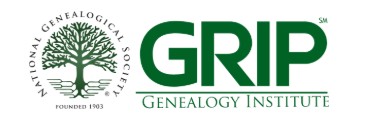GRIP Genealogy Institute
GRIP Genealogy Institute is “the” event for genealogists and family historians who want to develop their skills while meeting new friends in a collegial and collaborative community.
What is the GRIP Genealogy Institute?
The GRIP Genealogy Institute provides extensive week-long instruction on various genealogical topics. There are two GRIP programs, virtual and in-person options, which offer focused instruction in courses with eighteen class sessions taught by experts. This in-depth format offers students an immersive, high-level education designed to advance their research skills. Students can choose a course topic focusing on methodology, genealogical records, geographic regions, or ethnic groups. Additional practicum experiences allow the student to test their skills and advance their knowledge.
Features of the GRIP Genealogy Institute
GRIP offers two separate program options. 2026 Course offerings include a selection of 19 different courses to choose from. Students choose one course for the week:
- Nine Virtual courses offered from 22-26 June 2026
- Eight in-person courses offered from 12-17 July 2026
- Two special courses offered in the Fall 2026
Courses are tailored to build skills and enrich the knowledge base of intermediate and advanced genealogists. Each course session is designed and taught by recognized genealogical subject matter experts. Each year, the programs feature our most popular courses and exciting, new, never-before-offered courses.
Course registration includes:
- Eighteen class sessions held over five days (for virtual or in-person courses)
- Limited class sizes allowing for concentrated time with faculty and fellow students
- An electronic syllabus for personal use
- Class interaction and networking with fellow students and instructors
Attending the GRIP Genealogy Institute will help researchers:
- Achieve a deeper mastery of a subject that cannot be acquired by simply watching webinars or attending conference presentations.
- Explore a comprehensive range of records to assist in solving genealogical research questions.
- Learn from professional instructors with decades of expertise researching specific topics or regions.
Students have an option to participate in the virtual or in-person versions of GRIP (or both). Participating in the virtual program offers greater accessibility for individuals with busy family or work schedules, as it eliminates the need for travel and associated expenses. The in-person program allows students to break away from home distractions for complete immersion in the educational experience.
For more information about GRIP and the immersive experience it offers, we encourage you to read the article titled “NGS Introduces GRIP Genealogy Institute Program for 2024,” authored by Terry Koch-Bostic, FNGS, and Angela Packer McGhie, CG, featured in the January 2024 issue of the NGS Magazine, Volume 50, Number 1.
Benefits of Attending the GRIP Genealogy Institute
What can I expect from attending GRIP? All courses are designed to help researchers stay current with the latest developments in the field and expand their breadth and depth of knowledge through a learning experience that aids students in absorbing, comprehending, and retaining information. This knowledge can be applied in both their personal research or professional work.
For more information, visit https://grip.ngsgenealogy.org.
Boston University to Phase Out Genealogy Program
Boston University has made the difficult decision to phase out several of its non-credit programs within the Center for Professional Education, including the Genealogy Studies Program. This decision was made at the university level, in response to ongoing financial pressures faced by the university as a whole due to federal actions and university-wide drops in enrollment.
The program will officially conclude at the end of the Spring 2026 semester. Between now and then, prospective and current students will still have opportunities to enroll in courses and earn the certificate. Further information will be forthcoming via the BU website.
For 16 years, the Genealogy Studies Program has stood as a cornerstone in the field of genealogy education. We are proud of the program’s lasting contribution to the field, its role in advancing research skills and professional standards, and the accomplishments of our faculty and alumni. The Genealogy Studies Program has left a lasting legacy that will continue through the work of its graduates who now contribute their skills and knowledge to the field of genealogy.
Melissa Johnson
Program Director



